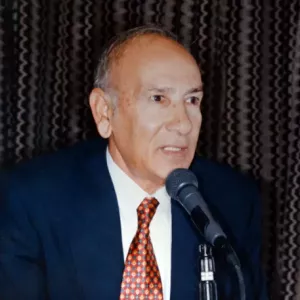
As a young man, Mulhim witnessed the horrors of the years prior to the Palestinian Nakba of 1948. What he endured as a young man during that period left an indelible mark on him that would influence his decisions for the rest of his life.
As a student in Palestine, Mulhim graduated from high school with the highest grades on a national level. His scores qualified him for a scholarship in the Britain and he would find his calling in the study of law.
During his primary school years he became involved in activism along with his colleagues. “These endeavors, however, weren’t structured for maximum effect, we were amateurs. Real and profound activism would come later during and after my school years as a student of law in Britain. My new education, my new multicultural experience on campus, and my exposure to diverse opinions remolded my character. I now viewed the world through a freer and more democratic prism; I’ve learned to tolerate and weigh in the opinions of others; you could say I’ve become the wiser,” Mulhim wrote in one of his editorials. “When I went back to the Middle East in 1951, it was a reverse culture shock for me.”
Arriving in his hometown Halhoul, Palestine in 1951; Mulhim would go to work immediately. He set up a marketing cooperative to inform and protect farmers against the feudal tendencies of landlords. He would help charter the Alumni Association in Hebron eventually, an organization that grew into a major Polytechnic in Palestine.
Mulhim later landed a job in Saudi Arabia’s Aramco (1951-1956), which was run then by an American management. During his time there, Mulhim supported the Saudi and Arab labor movement for attaining equal rights at work. Saudis later nationalized their country’s resources.
Mulhim’s early taste of activism and advocacy, even though it had cost him his job at Armco, reinforced his conviction that only through law and knowledge of the legal environment could labor in the Arab world evolve.
In 1956, he headed back to Jordan and found a job as Legal Council to the Jordanian Ministry of Economics. After one year he decided to launch his own law practice, through which he would frequently defend labor cases pro bono.
In 1961, Mulhim successfully defended the right to associate for bank employees in the Jordanian High Court and had done it amidst a period of martial law, which had dissolved all Jordanian associations. He also was instrumental in connecting the Jordanian Lawyers Association and the Arab Lawyers Union with the International Law Association. Mulhim continued to launch multiple labor associations and town councils across Jordan and Palestine. Most notable of those were the Palestine Lawyers Union and the Anti-Apartheid Wall Committee in Palestine.
Mulhim’s relentless advocacy for the defense of labor rights and the right to organize, along with his political affiliations with progressive liberal forces, eventually landed him in prison, twice. He had spent a total of two years in prisons in the period between 1959 to 1967.
Prison, however, did not slow him down. He actively continued to support the underprivileged classes and labor until his passing in the summer of 2015.
Earlier on and after Israel occupied the West Bank in 1967, and with regional political instability, Mulhim sought work in the nascent Arabian Gulf economies. He set up a law practice in Kuwait, which was then one of the Gulf’s most progressive states. He lived and worked there from 1967 to 1990, the year Iraq occupied Kuwait.
During his time in Kuwait, Mulhim collaborated on forming various foundations and civil organizations. He also worked on chartering the Palestine Welfare Organization in 1985; to which he also donated funds.
During that time, Mulhim also published a book that compiled the international voices that exposed Israel’s human rights abuses and the disastrous implications of the segregation wall.
In the wake of the first Gulf War, late in 1990, Jordanians and Palestinians were not welcome in the GCC as a result of the respective political decisions by their leaders, which were against invading Iraq and ousting Saddam Hussein. The war’s ensuing political upheaval drove an exodus of Jordanians back home, creating pressures on Jordan’s weak economy.
In 1992, Mulhim set up another law practice in Jordan. Seeing his countrymen suffer the sudden change to their livelihood, he and acquaintances from Kuwait would come together to organize support to unemployed Jordanians. These early support efforts would eventually inspire the idea for creating a dedicated organization that can pass to young Jordanians the skills needed for finding new jobs.
In 1992, Mulhim established the Rehabilitation & Welfare Society (renamed later Rewell Society). Its objectives are to support Jordanians who needed immediate help, as well as train young people and help them find jobs.
As the years passed, the Society grew in scope and functions, offering academic aid to students who couldn’t afford university or vocational school tuitions.
Mulhim passed away in 2015, but the Society’s philanthropic charter continued with his son Hazem managing it, himself a successful entrepreneur and CEO of the international financial technology company EastNets.
